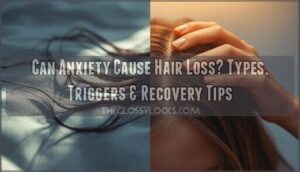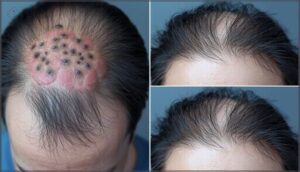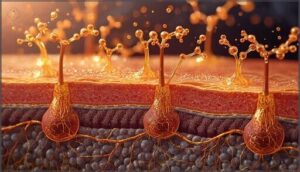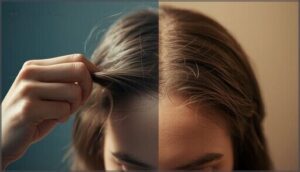This site is supported by our readers. We may earn a commission, at no cost to you, if you purchase through links.
The clumps of hair on your pillow, the unusual thinning at your temples, the moment you realize your ponytail feels noticeably thinner—these aren’t just aesthetic concerns, they’re physical manifestations of what’s happening inside your body when anxiety takes hold. Chronic anxiety doesn’t simply exist in your mind; it cascades through your entire system, triggering hormonal disruptions that can push hair follicles into premature shedding phases.
While many people recognize the mental and emotional toll of persistent stress, the connection between anxiety and hair loss remains surprisingly underappreciated, even though stress-triggered hair loss affects millions of people each year. Understanding how anxiety disrupts your hair’s natural growth cycle enables you to recognize the warning signs early and take targeted action to protect your hair health while addressing the underlying anxiety that’s driving the problem.
Table Of Contents
- Key Takeaways
- Can Anxiety Cause Hair Loss?
- Types of Hair Loss Linked to Anxiety
- How Anxiety Disrupts The Hair Growth Cycle
- Recognizing Symptoms of Anxiety-Induced Hair Loss
- Managing Anxiety to Support Hair Health
- Promoting Hair Regrowth After Anxiety
- Frequently Asked Questions (FAQs)
- Will hair loss from anxiety grow back?
- What does anxiety hair loss look like?
- What causes male hair loss?
- Is hair loss a common anxiety disorder symptom?
- Does lack of sleep cause hair loss?
- Can anxiety cause hair loss & Balding?
- Can anxiety cause hair to fall out?
- Does stress cause hair loss?
- Can anxiety cause hair loss & telogen effluvium?
- Will stress-related hair loss grow back?
- Conclusion
Key Takeaways
- Chronic anxiety triggers hair loss by elevating cortisol levels, which disrupts the natural hair growth cycle and pushes follicles into premature shedding phases, typically manifesting two to four months after stress begins.
- The three primary types of anxiety-related hair loss are telogen effluvium (diffuse shedding across the scalp), alopecia areata (autoimmune-triggered bald patches), and trichotillomania (compulsive hair pulling).
- Hair regrowth is highly reversible once you address underlying anxiety through stress management techniques, with most people seeing complete recovery within six to twelve months after implementing targeted interventions.
- Supporting hair restoration requires a combination of evidence-based approaches including cognitive behavioral therapy, stress reduction practices like meditation, balanced nutrition with key nutrients (iron, zinc, omega-3s), and gentle hair care routines that protect weakened follicles.
Can Anxiety Cause Hair Loss?
Yes, anxiety can cause hair loss, though the connection isn’t always straightforward and often involves multiple physiological pathways working together. When your body experiences prolonged anxiety, it triggers stress responses that can disrupt normal hair growth cycles, leading to noticeable shedding weeks or even months after the stressful period begins.
This is especially true if you’ve noticed a receding hairline alongside ongoing stress, as chronic tension can push more follicles into the shedding phase.
Understanding how anxiety actually triggers hair loss and separating medical facts from common misconceptions will help you recognize what’s happening and take appropriate action.
How Anxiety Triggers Hair Loss
Your body’s stress response sets off a chain reaction that directly targets hair follicles, and understanding this connection can help you regain control.
When anxiety strikes, elevated cortisol levels activate neurological factors that shift follicles from growth to shedding phase, a well-documented anxiety symptom. These stress hormones disrupt the natural cycle, reducing nutrient delivery to your scalp and weakening hair shafts.
The result is noticeable thinning that usually appears two to four months after a high-stress period, making stress management essential for protecting your hair health and restoring normal growth patterns. For a deeper explanation of how stress hormones cause hair loss, check current research and expert advice.
Common Myths Vs. Scientific Evidence
Myth busting reveals that anxiety doesn’t cause permanent hair loss, though many assume it does. Evidence-based research shows telogen effluvium from stress usually emerges weeks to months after an event, not immediately, and most shedding resolves with effective stress management.
Fact checking also clarifies that alopecia areata, while sometimes linked to autoimmune diseases, isn’t solely triggered by worry. Hair science confirms that trichotillomania differs from typical anxiety disorder treatment cases, requiring behavioral intervention.
Research findings consistently demonstrate that hair loss reverses within three to twelve months once you address underlying stress and prioritize consistent stress management practices.
Types of Hair Loss Linked to Anxiety
When anxiety takes hold of your body, it doesn’t just affect your mind—it can trigger specific types of hair loss, each with distinct patterns and mechanisms.
Understanding which type you’re experiencing is the first step toward taking back control and addressing the root cause. Let’s examine the three primary forms of anxiety-related hair loss and how they manifest.
Telogen Effluvium Explained
Telogen effluvium stands out as the most common form of stress triggered loss you’ll encounter, affecting approximately 30 to 60 percent of your scalp hairs when anxiety pushes follicles prematurely into the telogen phase. Your hair shedding patterns usually emerge two to four months after the stressful event, though the recovery timeline offers reassurance.
- Hair follicle health remains intact without permanent scarring
- Shedding concentrates diffusely across your entire scalp
- Most regrowth begins within three to six months after addressing anxiety
- Full hair regrowth commonly occurs within one year when triggers resolve
One important aspect to note is that hair growth usually returns to normal within six months to a year after the initial shedding phase.
Alopecia Areata and Anxiety
While telogen effluvium usually reverses itself, alopecia areata presents a different challenge as an autoimmune disease where your immune system mistakenly attacks hair follicles, creating distinct bald patches. Anxiety triggers this condition through neuroendocrine impact, activating inflammatory pathways that cause hair follicle damage and immune privilege collapse around your follicles.
Understanding signs of damaged hair follicles helps you identify when inflammation has stopped and remodeling might begin.
| What Anxiety Does | How Your Body Responds |
|---|---|
| Activates stress hormones | Immune system attacks follicles |
| Triggers inflammation | Creates circular bald patches |
| Disrupts immune regulation | Hair loss becomes unpredictable |
| Compounds emotional distress | Worsens anxiety symptoms |
Stress management becomes particularly important here, as the psychological burden of living with this autoimmune condition can create a frustrating cycle where anxiety and hair loss feed into each other.
Trichotillomania as an Anxiety Response
Compulsion distinguishes trichotillomania from other stress and hair loss conditions, as anxiety triggers drive you to physically pull out your own hair, often without conscious awareness. Hair pulling intensifies when cognitive worry about appearance or other anxiety symptoms escalates, creating a cycle where emotional regulation becomes increasingly difficult without proper intervention.
- Cognitive therapy reduces pulling by addressing worry patterns that fuel urges during stress response episodes
- Inhibitory control weakens under anxiety, making it harder to resist the compulsion despite recognizing the behavior
- Stress management and habit reversal training help you establish alternative coping mechanisms that support better emotional regulation
How Anxiety Disrupts The Hair Growth Cycle
Your hair follows a predictable growth cycle under normal conditions, but anxiety doesn’t play by the rules.
When stress hormones flood your system, they can push hair follicles into premature shutdown, disrupting the natural rhythm that keeps your scalp healthy and full.
Understanding how this disruption unfolds gives you the knowledge to recognize what’s happening and take back control.
Stress Hormones and Hair Follicles
Your body’s stress response doesn’t just live in your mind—it reaches deep into your scalp, where hair follicles become unwitting targets of circulating stress hormones. When anxiety strikes, corticotropin releasing hormone and norepinephrine directly signal follicle cells, while elevated cortisol disrupts the delicate balance of hair growth cycles, potentially triggering premature shedding and prolonged resting phases.
Anxiety floods your scalp with stress hormones that disrupt hair growth cycles, causing premature shedding and longer resting phases
| Stress Signal | Follicle Impact | Growth Cycle Effect |
|---|---|---|
| Corticotropin releasing hormone (CRH) | Activates receptors on follicle cells | Disrupts normal anagen-catagen shift |
| Norepinephrine from sympathetic nerves | Alters follicle cell signaling pathways | Shortens active growth phase |
| Elevated cortisol levels | Suppresses stem cell proliferation | Prolongs telogen resting phase |
| Inflammatory cytokines | Compromises follicle microenvironment | Accelerates shift toward shedding |
Understanding this follicle stress response reveals why hormone imbalance during anxious periods can transform healthy hair growth cycles into stress-induced hair loss, though stem cell activation remains possible once you reduce cortisol effects through targeted anxiety management.
The Impact of Cortisol on Hair Shedding
Elevated cortisol levels create a domino effect across your scalp, directly binding to glucocorticoid receptors in hair follicle cells and shifting hormonal balance toward prolonged shedding phases. This stress response weakens your hair’s structural foundation through reduced matrix protein production, while inflammatory signals accelerate follicle aging and contribute to stress-induced hair loss over time.
- Cortisol extends resting phases, increasing daily hair shedding beyond normal levels
- Weakened extracellular matrix around follicles causes brittle shafts prone to breakage
- Pro-inflammatory scalp environment disrupts ideal scalp health and growth signaling
Sudden Vs. Gradual Hair Loss Patterns
Recognizing whether you’re facing sudden hair loss helps pinpoint the underlying cause and informs your treatment approach. Sudden shedding usually signals telogen effluvium, where stress-induced hair loss appears two to three months after a triggering event.
While gradual thinning patterns suggest chronic mechanisms affecting follicle health, scalp examination findings, and hair regrowth phases over extended periods.
Recognizing Symptoms of Anxiety-Induced Hair Loss
When anxiety starts affecting your hair, your body sends clear signals that something’s shifted in your normal growth cycle.
These symptoms often appear weeks or even months after a stressful period, which can make the connection harder to recognize at first. Understanding what to watch for helps you take control early and seek appropriate treatment before the shedding becomes more extensive.
Excessive Hair Shedding
You’ll notice stress-induced hair loss when you find more than 100 hairs on your pillow, in the shower drain, or between your fingers after a simple run-through.
Common hair shedding patterns tied to anxiety include:
- Diffuse thinning across the entire scalp rather than isolated patches
- Increased strands visible after shampooing or brushing
- Sudden onset following a significant stressor or emotional event
- Accompanying nutrient deficiencies that compromise scalp health and hair follicle care
This shedding usually signals telogen effluvium, where stress hormones push follicles prematurely into the resting phase.
Thinning at Temples or Crown
Your hairline may start to retreat at the temples, or you might see a widened part exposing the scalp at your crown—both are telltale signs of stress-induced hair loss.
Crown thinning causes often involve telogen effluvium, while temple hair loss can reflect traction alopecia from tight hairstyles or hormonal shifts.
Scalp inflammation further compromises hair follicle health, accelerating alopecia and disrupting normal stress and hair growth dynamics.
Accompanying Physical and Emotional Symptoms
Beyond the mirror, anxiety effects ripple through your body—muscle tension builds in your neck and shoulders, while elevated cortisol and chronic stress responses disrupt your sleep, exacerbate headaches, and trigger digestive discomfort. Mental health struggles often manifest as physical symptoms you can’t ignore.
- Persistent fatigue that worsens despite rest attempts
- Racing heart or palpitations during worry episodes
- Stomach upset, nausea, or appetite changes
- Difficulty concentrating or memory lapses
- Irritability and emotional triggers that feel intensified
Hair loss becomes one visible marker among many stress-driven changes.
Managing Anxiety to Support Hair Health
Managing your anxiety effectively is one of the most direct ways to protect your hair from stress-related shedding and support long-term regrowth. While the connection between mental health and hair follicles may seem indirect, research consistently demonstrates that reducing chronic stress can halt or reverse telogen effluvium and other anxiety-triggered hair loss patterns.
The following approaches offer evidence-based strategies to calm your nervous system, reduce cortisol levels, and create the physiological conditions your hair needs to recover.
Stress Reduction Techniques (Meditation, Deep Breathing)
Daily mindful meditation and deep breathing effectively activate your relaxation response, reducing cortisol levels that trigger hair shedding. You can start with simple breathwork therapy, such as box breathing (inhale four seconds, hold four, exhale six), practiced for just five minutes. These calming exercises lower your resting heart rate by five to ten beats per minute after several weeks, supporting healthier hair growth while managing stress-related anxiety.
| Technique | Method | Benefit |
|---|---|---|
| Mindful Breathing | Slow 4-second inhale, 4-second pause, 6-second exhale | Reduces perceived stress and lowers heart rate within minutes |
| Box Breathing | Equal 4-4-4-4 counts for inhale-hold-exhale-hold | Decreases cortisol levels and steadies nervous system after consistent practice |
| Guided Meditation | Body scan or focused attention sessions lasting 10 minutes | Improves sleep quality and reduces intrusive worry immediately |
| Progressive Muscle Relaxation | Alternate tensing and relaxing muscle groups | Eases physical tension, headaches, and improves autonomic balance over weeks |
Cognitive Behavioral Therapy and Counseling
Just as relaxation techniques calm your body, Cognitive Behavioral Therapy offers practical tools for managing anxiety-driven hair loss.
Therapy benefits include:
- Challenging catastrophic beliefs about regrowth
- Building mindful routines that prevent avoidance
- Using counseling strategies for healthier self-talk
- Tracking triggers and responses for long-term anxiety management
Psychological therapy helps you reclaim control, supporting both stress relief and hair health.
Importance of Social Support
While therapy reshapes your mental patterns, the people around you can be just as restorative. Social connections reduce stress hormones that disrupt hair follicles, while support networks provide emotional validation during anxious periods.
Community help and peer encouragement sustain healthy habits like sleep and nutrition, both essential for hair regrowth. Mental health awareness starts with letting trusted friends safeguard your emotional wellness strategies.
Promoting Hair Regrowth After Anxiety
Once you’ve addressed the underlying anxiety, your focus naturally shifts to supporting the regrowth process and restoring hair health.
Recovery requires a combination of targeted nutrition, thoughtful hair care practices, and realistic expectations about timing.
The following sections outline evidence-based strategies to enhance your hair’s return to its normal growth cycle.
Nutrition and Lifestyle Changes
Restoring hair requires balanced diet choices that include vegetables, whole grains, and lean proteins to supply amino acids needed for keratin production.
Healthy habits like adequate sleep, regular exercise, and hydration support follicle recovery and stress management for hair health.
Nutrient supplements targeting iron, zinc, and omega-3s can address deficiencies that contribute to hair loss, creating integrated approaches that promote wellness and long-term hair regrowth.
Hair Care Tips for Recovery
Protecting weakened strands starts with selecting a sulfate-free gentle shampoo twice weekly, allowing your scalp to heal without irritation that worsens hair loss. Combine this with a daily 4-minute scalp massage using fingertips to boost circulation and support hair regrowth, while weekly hair masks restore moisture to damaged follicles.
| Hair Care Practice | Frequency & Method |
|---|---|
| Gentle Shampoo | Twice weekly with lukewarm water focusing on scalp care |
| Scalp Massage | 4 minutes daily using circular motions to stimulate follicles |
| Hair Masks | Once per week for deep conditioning and moisture restoration |
Protective styling minimizes breakage by avoiding tight ponytails, while nutrient supplements address deficiencies contributing to stress management for hair health and overall scalp care during recovery.
Reversibility and Timeline of Hair Regrowth
Recovery from stress-induced hair loss offers genuine hope, as follicle recovery usually begins within 3 to 6 months once you address anxiety’s stress impact on the hair growth cycle.
Full hair restoration to previous thickness requires 6 to 12 months, with regrowth patterns following your original follicle distribution. Visible regrowth timeline improvements emerge through consistent hair regrowth techniques, healthy nutrition supporting hair cycle restoration, and sustained stress management practices.
Frequently Asked Questions (FAQs)
Will hair loss from anxiety grow back?
Yes, hair usually regrows once anxiety diminishes and stress management improves.
Most individuals notice regrowth within six to nine months as hair follicles reset their growth cycle, provided underlying triggers resolve.
What does anxiety hair loss look like?
Anxiety-induced hair loss presents as diffuse thinning across your scalp, particularly at the crown and temples, with increased shedding during washing or brushing and noticeable scalp visibility as hair density decreases uniformly.
What causes male hair loss?
By age 50, male pattern baldness affects 30 to 50 percent of men, driven by genetic factors, hormonal imbalance involving DHT, and scalp health conditions that weaken hair follicles over time.
Is hair loss a common anxiety disorder symptom?
Hair loss isn’t listed as a core anxiety symptom in diagnostic manuals, though many patients report shedding during intense stress.
Most people with anxiety never notice increased hair loss, making it an occasional companion rather than typical manifestation.
Does lack of sleep cause hair loss?
Ironically, the rest you think you’re saving by skipping sleep may cost you hair.
Sleep deprivation elevates cortisol, disrupting hair follicles and triggering stress-induced hair loss, while restorative sleep promotes hormone balance and healthy growth.
Can anxiety cause hair loss & Balding?
Yes, psychological distress can trigger stress-induced hair loss through elevated cortisol and disrupted follicle cycles, leading to telogen effluvium or worsening alopecia.
Anxiety triggers don’t directly cause pattern balding, though they accelerate shedding and thinning temporarily.
Can anxiety cause hair to fall out?
Anxiety triggers hair loss by elevating stress hormones like cortisol, which disrupt the hair growth cycle and push follicles into a prolonged resting phase, resulting in noticeable shedding weeks or months after stressful episodes begin.
Does stress cause hair loss?
Chronic stress elevates cortisol levels, disrupting your hair growth cycle and triggering stress-induced hair loss like telogen effluvium.
Where follicles enter a resting phase, causing noticeable hair shedding and thinning across your scalp.
Can anxiety cause hair loss & telogen effluvium?
Contrary to popular belief, your mental state directly impacts hair follicles. Anxiety triggers telogen effluvium by elevating cortisol levels, shifting follicles into shedding phase—a stress-induced hair loss pattern that usually appears two to three months after heightened stress response begins.
Will stress-related hair loss grow back?
Most individuals experiencing stress-induced hair loss see complete hair regrowth within three to six months once stress management and follicle recovery begin, as hair restoration follows the natural hair growth cycle resuming its normal progression.
Conclusion
Your hair doesn’t have to become collateral damage in anxiety’s relentless assault on your well-being. While the question “can anxiety cause hair loss” has a definitive yes, the answer to whether you’ll recover is equally affirmative—provided you address both the psychological triggers and the physical manifestations simultaneously.
By implementing stress-management strategies alongside evidence-based hair care protocols, you’re not just waiting for regrowth; you’re actively reclaiming control over your body’s response to anxiety.
- https://links.e.response.mayoclinic.org/EmailPreview-GeneralHealth
- https://mcforms.mayo.edu/mc5200-mc5299/mc5256-01.pdf
- https://pmc.ncbi.nlm.nih.gov/articles/PMC9917549
- https://my.clevelandclinic.org/health/diseases/24486-telogen-effluvium
- https://www.sciencedirect.com/science/article/pii/S0092867425012474











